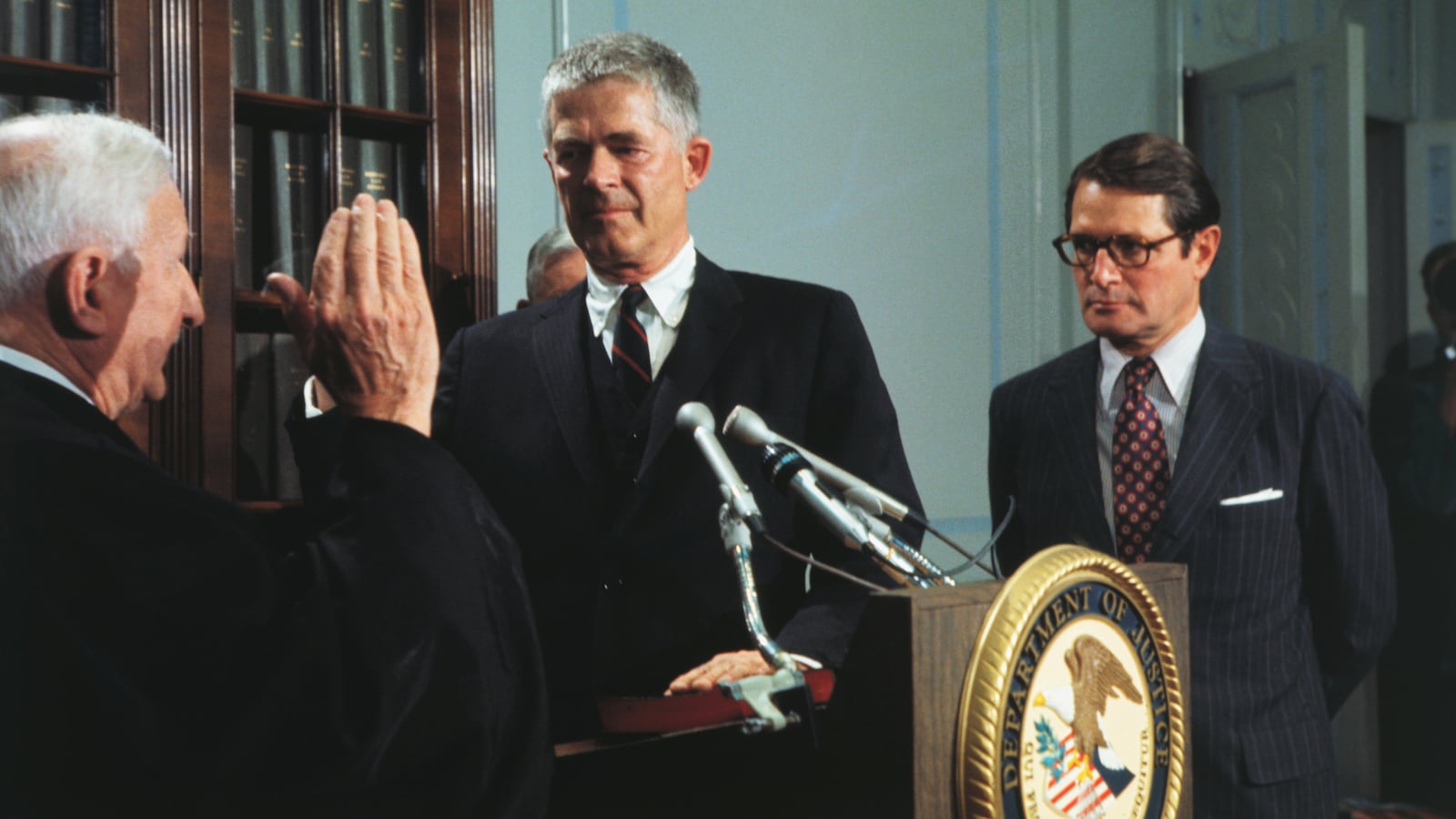With new revelations that former Trump campaign chairman Paul Manafort offered regular campaign briefings to a Russian oligarch with close ties to the Kremlin, the shoes continue to drop in the Russian investigation. As special counsel Robert Mueller’s investigation gathers steam, I’ve been thinking a lot lately about one of my heroes and what he’d be doing and saying if he were still around.
Archibald Cox was chairman of Common Cause’s national governing board when I came to work at the organization in 1985. Like everyone else, I was in awe of him and the courage and personal integrity he had shown in the fall of 1973, when he stood up against President Richard Nixon on behalf of the rule of law. With President Trump having already fired the FBI director and threatened to fire or force out his attorney general as well as the special counsel investigating Russian attacks on the 2016 presidential election, we desperately need individuals in government today with Cox’s mettle.
Archie—as he always insisted we call him—looked more like a college professor, which he was, than a lion of democracy, which he also was. There was a buzz in the office whenever he came in to confer with Fred Wertheimer, our president at the time; 30-plus years later, the quiet, self-effacing way he greeted and spoke to everyone, even junior staffers like me, sticks in my memory.
Archie rose to every occasion, sensing and doing the right thing without hesitation. Bow ties were his trademark, but despite his professorial appearance, he was a dogged defender of democracy for everyday Americans. His example set me on the career I’m still pursuing, advocating for open, honest, and accountable government and amplifying the voice of the people.
In 1987, when President Reagan tapped Robert Bork to fill a Supreme Court vacancy, the Common Cause board began to weigh whether we should set aside our usual neutrality on Court nominees to oppose him. Most of us remember Bork’s role during Watergate as the man who followed President Nixon’s order and fired Archie in the infamous “Saturday Night Massacre” of 1973 after Attorney General Elliot Richardson and Deputy William Ruckelshaus quit rather than do so.
You might think Archie would have jumped at the chance to help keep Bork off the Court; he certainly had plenty of reasons to oppose the nomination. But Archie would have no part of it.
Before the board discussion could get started, Archie declared that he would not take part. What followed was a master class lecture in conflicts of interest and recusal. If he participated and the board ultimately decided to oppose Bork (it did), the action would be seen as a product of their personal history and our credibility as an organization would be damaged; he couldn’t even judge his own perceptions of Bork absent their professional history, Archie said.
As Watergate special prosecutor, Archie had shown everyone that behind his professorial air and good manners was a fierce dedication to the rule of law and a determination to stand up for it, whatever the cost to him personally. In the Bork nomination, nearly 15 years after Watergate, I saw that dedication and determination matched by patience and faith that the system is resilient and bigger than any individual.
Our democracy’s resilience is being tested again. Like Nixon, Trump sets himself above the law. He denies the people’s right to know about his taxes or potential conflicts of interest, threatens journalists, and is attempting to end any investigation into potential wrongdoing by his campaign.
The hyper-polarization many of us trace to the Bork era has become endemic to our politics. Millions of citizens, at every point along the political spectrum, have given up or are on the verge of giving up on our democracy. Our polarized political culture treats compromise as a sign of weakness; obstruction is its standard operating procedure. There was a collegiality—or at least a tolerance—between the parties that made possible the difficult investigations Archie led as special prosecutor and Congress conducted in televised hearings. The absence of that collegiality today should concern everyone, regardless of party, who believes in government of, by, and for the people.
Many Americans believe our president is dangerously unstable and may have collaborated with Russian cyber-saboteurs to sway the last election. Many others believe only a president like Donald Trump, from outside the political structure and committed to shaking it to its core, can fix what ails our democracy.
All Americans though deserve to know what happened in the 2016 election. Robert Mueller’s investigation of the Russian attacks on our democracy must be allowed to proceed unmolested by the Trump administration. Americans need to know what the Russians did to try to sabotage the election and whether anyone helped them or even knew of the attack and looked the other way. Democrats and Republicans alike in Congress must have the special counsel’s back, and if necessary hold the executive branch accountable if it continues in its attempts to interfere.
With each day seeming to bring new revelations about Russia’s activities and ties to Paul Manafort and other Trump campaign staffers, Archie would remind us that a proper investigation takes time and must be done with great care, following the evidence wherever it may lead. Archie Cox would tell all of us to stay on the case and put country before party. I’m convinced that despite our divisions and our cynicism, we will.
In the cynical depths of the Watergate days, as I contemplated a career as a democracy activist, Archie’s example of focusing on the facts and staying patient with our system of laws kept me on track. Now, as I think about how the next generation of democracy activists may be shaped by today’s crisis, I’m determined to keep following Archie and remind tomorrow’s leaders, as well as those in power today, that in our democracy, the rule of law trumps self-interest and the people trump partisan politics.





